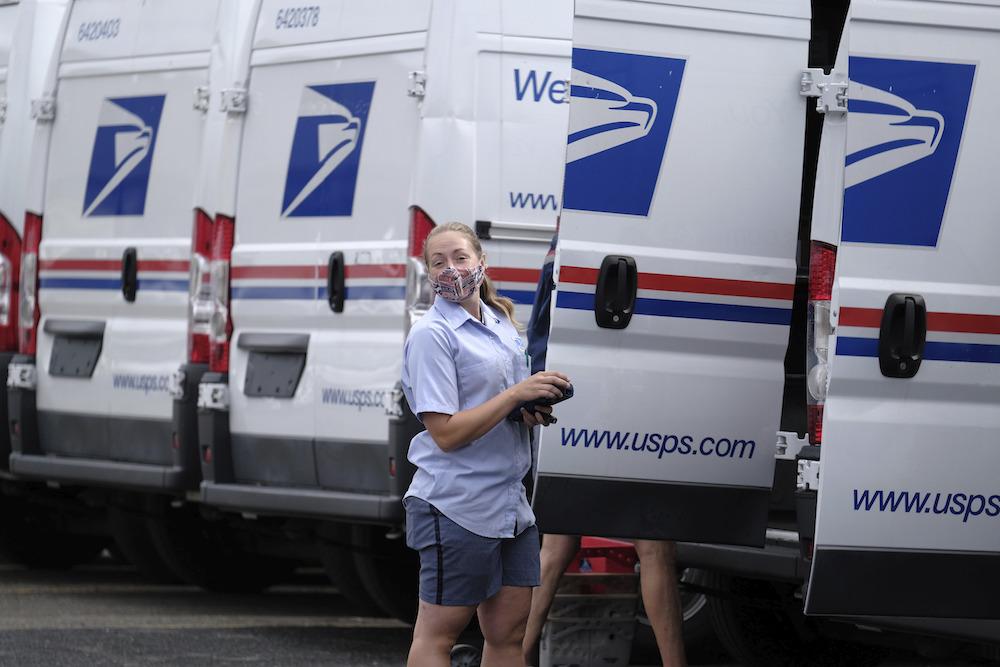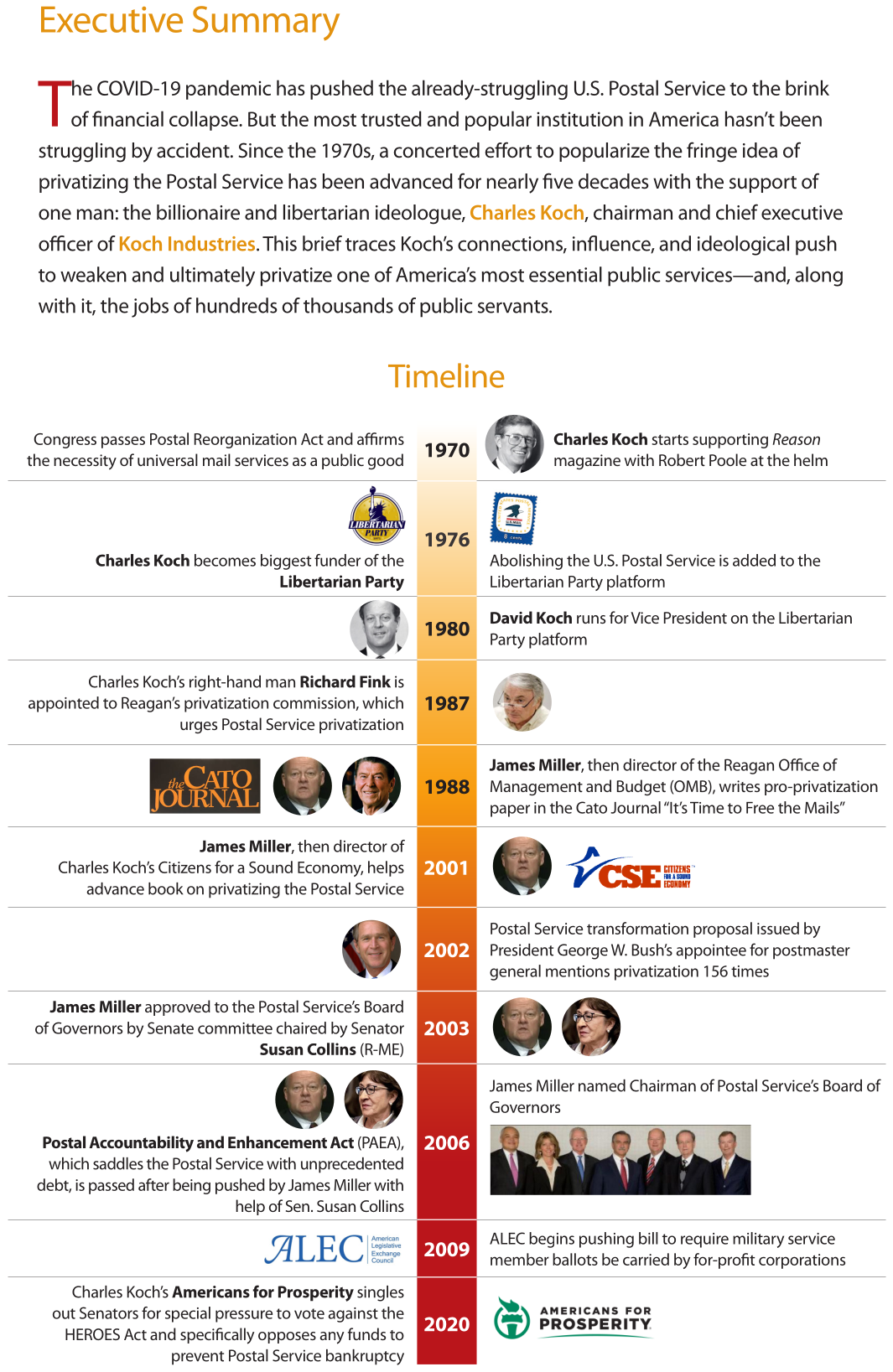Without action from Congress, the financial problems of the Postal Service could mean problems for everyone.
-
Beginning a shift in Portland, Oregon, in May, 2020.
-
1976. Charles Koch becomes biggest funder of the Libertarian Party. Abolishing the U.S. Postal Service is added to the Libertarian Party platform. [In 1980, Charles Koch's brother David Koch unsuccessfully ran for Vice President on the Libertarian Party platform. ... In 2012, David Koch spent over $100 million to oppose the re-election of President Barack Obama.]
-
1987. Charles Koch's right-hand man Richard Fink is appointed to Reagan's privatization commission, which urges Postal Service privatization.
-
1988. James Miller, then director of the Reagan Office of Management and Budget (OMB), writes pro-privatization paper in the Cato Journal "It's Time to Free the Mails." [The Cato Institute was formerly the Charles Koch Foundation.]
-
2001. James Miller, then director of Charles Koch's Citizens for a Sound Economy, helps advance book on privatizing the Postal Service. [In 2004, Citizens for a Sound Economy split into FreedomWorks and Americans for Prosperity.]
-
2009. The American Legislative Exchange Council (ALEC) begins pushing bill to require military service member ballots be carried by for-profit corporations. [According to the Center for Public Integrity, ALEC in received $150,000 from Charles and David Koch. Greenpeace claims that ALEC has received $525,858 from Koch foundations between 2005 and 2011.]
-
2020. Charles Koch's Americans for Prosperity singles out Senators for special pressure to vote against the HEROES Act and specifically opposes any funds to prevent Postal Service bankruptcy
[Image source. Click image to open in new window.]
[Image source. Click image to open in new window.]
For 50 years, multibillionaire Charles Koch has nudged Washington toward >his dream of privatizing the United States Postal Servicenew study from True North Research shows how the coronavirus crisis may present an opportunity for Koch to finish the job that he started in 1970, putting 500,000 jobs at risk and risking the efficacy of the 2020 election.
"Charles Koch is on the precipice of achieving his long-standing objectives of privatizing the Postal Service that hundreds of millions of Americans rely on every day," says Lisa Graves, the author of the new study. "His position remains an outlier position with the American people, but it's gained currency in the Republican Party."
The USPS has operated for more than two centuries and is one of the few government agencies named in the United States Constitution. It is the most popular government agency and historically benefited from bipartisan support to protect its operations. But after decades of attacks funded both directly and indirectly by Koch, that support from Congress has been chipped away, Graves's report explains. And whispers of privatization started in the Reagan era have been elevated to full volume today.
The CEO and chairman of the manufacturing conglomerate Koch Industries has never held public office. His brother and business partner David became the Vice-Presidential candidate for the Libertarian Party in 1980 (after Charles became the party's biggest donor), and put privatizing the Postal Service into the platform. David Koch and presidential nominee Ed Clark earned only about 1 percent of the vote, but Koch patiently worked to move his ideas further and further into the mainstream.
He's built a powerful and wealthy network of peers, who share his goals for privatizing as many public services as possible. From the Heritage Foundation and the Cato Institute to political action networks and PACs, Koch has worked to build support for his ideas while also having the financial capital to run ads against politicians who resist them.
Koch also invested in magazines and other publications that support his agenda. This includes a publication called Reason run by Robert Poole, which published an article calling for the privatization of the post office back in 1968. Poole was able to popularize the term "privatization" partially because of Koch's commitment to buying advertising space, Graves explains; however, the word originates from Nazi Germany.
"Many people hear his name but may dismiss his influence or may not really fully understand the scope of his impact. I think when historians look back on this period of the past ten years, they'll see Charles Koch actually had a singular impact on American laws and policies and politics," Graves says. "That's not to say he's the sole person who has pushed this agenda forward, and he's certainly cultivated allies to advance his agenda, but it was not a dominant agenda before the 1970s, [and] as I wrote in my article, [privatization] was not even a term that was in popular use."
The report makes the case that Koch has influenced Washington like no other individual today, and the Postal Service has long been one of his targets. This may be because of its unique success, Graves says. The USPS charges less than its private competitors, FedEx and UPS, while also being able to deliver to more locations. The Postal Service also sends millions of pieces of mail a day (before the pandemic, that number was almost 500 million), and private companies and free-market enthusiasts are eager for a portion of those transactions.
The USPS is particularly vulnerable now because of the COVID-19 crisis decreasing its revenues, like many other businesses around the world. But the threat also exists because several Koch strategies are reaching their full effects, Graves explains.
"In some [cases] that's been having their people in the right place at the right time," Graves says. This staffing started as long ago as 1987, when Koch's "right-hand man" Richard Fink was appointed to President Reagan's privatization committee and urged to privatize the Postal Service. The following year, James Miller wrote a paper on the benefits of privatizing the USPS for the Cato Institute, while leading the Office of Management and Budget.
Miller later ran Koch's political advocacy group, then called Citizens for a Sound Economy, and now sits on the board of its current operation, Americans for Prosperity. However, this member of Koch's inner circle would become most useful when he was confirmed as a member of the Postal Service's Board of Governors in 2003, by a committee chaired by Sen. Susan Collins (R-ME). By 2003, Miller's views on the USPS were clear. He was "openly antagonistic," Graves says, but nonetheless he became a member of the agency he wanted to terminate.
Just three years later, Miller (by this point chair of the Board of Governors) would push Collins to support legislation that forced the USPS to pre-fund benefits for its employees 75 years into the future, allocating funds for employees who aren't even born yet. This weighed on the Postal Service's balance sheets so it went from annual profits of about $1 billion to losses, after having to account for $5 billion more in expenses each year, Graves explains. The Postal Accountability and Enhancement Act of 2006 also prevented the USPS from raising stamp prices and implementing the now much-discussed postal banking system (though pilot programs could still be undertaken). Miller served on the Board of Governors until 2012.
"I'm surprised that people like Sen. Collins and others have not really, fully accepted responsibility for their role in saddling the [USPS] with debt and making it very difficult for it to raise [stamp prices] even a small amount, beyond just a penny," Graves says. "I wish that they would take responsibility and would work to repair the post office and to make sure it really has the flexibility to thrive as a major public service."
Senators do have a chance to redeem themselves by voting for the HEROES Act, which was passed by the House in May. The legislation responds to the needs of individuals, businesses, and the public-health sector caused by the coronavirus crisis and would provide $25 billion in emergency funding as well as an additional $10 billion credit line to the Postal Service.
This immediate funding would prevent the collapse of the Postal Service, which predicts it will run out of money by the end of September. Support from Congress would not only protect the hundreds of thousands of people employed by the USPS, Graves explains, but also allow the Postal Service to continue its essential services, which include delivery of medicine and Social Security checks to individuals, as well as transporting goods to hospitals and other businesses.
This year, the Postal Service will also be essential to the national elections, as more Americans than ever opt to vote by mail because of the coronavirus. Weakening, privatizing, or eliminating the Postal Service at this critical time could severely damage the right to vote, an alternative benefit to the Koch network, which is funding a dark-money network called the "Honest Elections Project," designed to ramp up dubious concerns about voter fraud and ultimately suppress votes.
Even in states with well-established vote-by-mail systems, like in Washington, Secretary of State Kim Wyman told the Prospect in May that there are concerns that their voting procedures could not be carried out by any other private service.
Without action from Congress, the financial problems of the Postal Service could mean problems for everyone and could even influence who serves as the next president. The current Postmaster General, Louis DeJoy, has no experience in the Postal Service but instead was a major donor to the Republican National Committee (RNC) and the Trump for Victory PAC. DeJoy was handpicked by Trump in May 2020 and is largely seen as an ally of the president's and the anti-remote voting efforts.
"At a time when it needs someone devoted to preserving this public institution we have the opposite. And we have someone who is an ally of Trump, who has gone on rants against voting by mail despite the evidence against him," Graves says. "We need to have a U.S. Postal Service that is fully functioning more than ever for our democracy to function."
Return to Persagen.com

